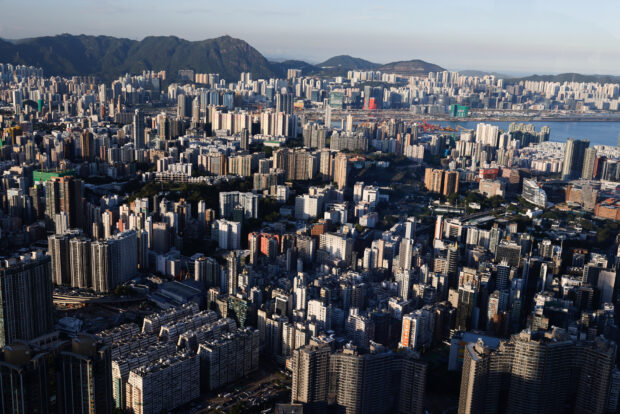Explainer: Why Hong Kong wants new national security laws

A general view of skyline buildings, in Hong Kong, China July 13, 2021. REUTERS FILE PHOTO
HONG KONG — Hong Kong’s government announced on Tuesday that it hopes to swiftly pass new national security laws. A public consultation document was also released. A deadline for its eventual passage into law has yet to be announced.
What are the new laws likely to involve?
The package, known as Article 23, is designed to update or create news laws to prohibit treason, sabotage, sedition, the theft of state secrets and espionage as well tightening control over foreign political bodies and organizations operating in the city.
The need for those specific laws is briefly stipulated in Article 23 of the Basic Law, the mini-constitutional document that has guided Hong Kong’s relations with its Chinese sovereign since its handover from British colonial rule in 1997.
A previous attempt to enact Article 23 in 2003 was shelved after an estimated 500,000 people staged a peaceful protest against proposals.
Isn’t Hong Kong already subject to national security laws?
Yes. It has several old, vague and arcane laws from its days as a British colony that remain on the books.
Beijing also imposed a sweeping national security law on its freest city in 2020, with officials saying it was needed to bring stability after months of pro-democracy protests rocked Hong Kong in 2019.
READ: Hong Kong to create more ‘national security’ crimes
That law dealt with only some offenses, such as collusion with foreign forces, and also allowed mainland national security officers to be based in the city for the first time.
It also created a provision where suspects could be sent for trial in the mainland, where the courts are under the control of the ruling Communist Party.
The 2020 law highlighted the need for Hong Kong to continue its work on Article 23, creating local legislation. Senior Hong Kong officials say it is need to fill legal holes, particularly to deal with what they describe as “soft resistance” after 2019, and internet control.
Security chief Chris Tang has repeatedly said the government needs better tools to deal with espionage and the activities of foreign agents in the city.
What impact could they have?
Businesses including foreign banks, hedge funds and private research operations, along with diplomats and academics are watching developments closely. Some are concerned the bill could lead to controls on the internet or impact data operations.
The consultation document does create a new sabotage offense of unlawfully using a computer or electronic system to endanger national security.
Research of China’s politics, economy and military and due diligence investigations into individuals and companies on the Chinese mainland – all traditionally carried out by some Hong Kong firms and academics – could stray into areas of state secrecy, some fear.
The consultation document defines a list of state secrets in Hong Kong, including economic, scientific, diplomatic and social secrets, but says to be classed as such they would have to endanger national security if released.
Simon Young, a professor at the University of Hong Kong law school, said while many unknowns remained, he thought the law would ultimately adopt broad definitions for both a foreign political organization and a foreign agent.
“It may well be that businesses or groups that have some connection with foreign governments might be captured here,” Young said.
Hong Kong’s leader John Lee said on Tuesday and the laws would meet international standards and protect Hong Kong’s rights and freedoms.
Doesn’t China already have a state secrets law?
Reflecting the priorities of President Xi Jinping, China updated its own state secrets laws in 2023, banning the transfer of any information related to national security and broadening the definition of espionage. Some analysts say it remains vague.
Hong Kong’s own version has to deal with state secrets but with legislation compatible with the standards of the British-based common law, of which it remains a part.
Hong Kong could bridge the two with some tight definitions of what is protected, bringing clarity, but “the mainland concept and legal definition of state secrets still looms large and we can’t ignore that,” Young said.
Will the new laws pass easily?
Unlike the tensions that surrounding the bill in 2003, the final Article 23 bill is expected to pass easily and relatively swiftly, after formal readings of the bill and some debate in the Legislative Council. Changes to Hong Kong’s electoral system after 2019 mean that pro-establishment figures screened as “patriots” control the body.